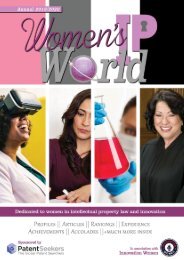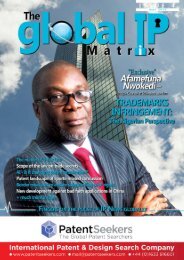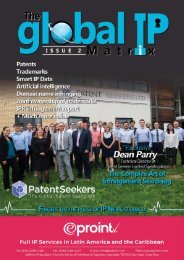Global IP Matrix - Issue 7
Dear readers, We sincerely hope that you are all in good health and keeping in good spirits during these undeniably uncertain times. We have all had to adapt to working out of our comfort zones, which I am sure has been very challenging at times for you all as it has been for us. However, we continue our quest to look to the future and deliver exclusive content to you, direct from thought leaders working at ground level in the IP industry from all over the world. Issue 7 of The Global IP Matrix magazine is packed with informative and exciting articles to keep you up to date and educated in what has been developing in the global IP industry during the past few months and into the future. We hope you enjoy reading our publication. We want to thank all our contributors for sharing their knowledge, opinions, and expertise in this new edition of the Global IP Matrix magazine. From all of us at The Global IP Matrix & Northon's Media, PR & Marketing Ltd
Dear readers,
We sincerely hope that you are all in good health and keeping in good spirits during these undeniably uncertain times. We have all had to adapt to working out of our comfort zones, which I am sure has been very challenging at times for you all as it has been for us.
However, we continue our quest to look to the future and deliver exclusive content to you, direct from thought leaders working at ground level in the IP industry from all over the world.
Issue 7 of The Global IP Matrix magazine is packed with informative and exciting articles to keep you up to date and educated in what has been developing in the global IP industry during the past few months and into the future. We hope you enjoy reading our publication.
We want to thank all our contributors for sharing their knowledge, opinions, and expertise in this new edition of the Global IP Matrix magazine.
From all of us at The Global IP Matrix & Northon's Media, PR & Marketing Ltd
You also want an ePaper? Increase the reach of your titles
YUMPU automatically turns print PDFs into web optimized ePapers that Google loves.
TRADITIONAL KNOWLEDGE AND RELATED
INTELLECTUAL PROPERTY ISSUES IN
THE ERA OF THE
COVID-19 PANDEMIC
“Let’s drink this herbal
tea to protect ourselves,
to protect our families,
and our neighbours
[…] and there will be
no more deaths”
President of Madagascar,
President Andry Rajoelina. 1
TRADITIONAL
AFRICAN CULTURES
Such statements are not uncommon among Africans. This is because African cultures and beliefs
promote traditional knowledge and traditional medicines in particular, as a key source of healing.
In fact, the current responses from Africans to the COVID-19 pandemic reaffirms African beliefs
in the value of traditional medicines. Therefore, it is not surprising that despite caution from the
World Health Organisation (WHO) on self-medication relative to symptoms of the COVID-19,
social and mainstream media are inundated with stories of traditional medicines as a cure for
COVID-19.
Covid Organics (CVO) is an example of such traditional medicines. The medicine was developed
by the Malagasy Institute of Applied Research in Madagascar and has so far been shipped to many
African countries, namely: Comoros Island. Guinea Bissau, Equatorial Guinea, the Democratic
Republic of Congo. Liberia, Niger, Tanzania, Nigeria, Senegal, and Chad. 2
Traditional knowledge though not specifically defined in the reviewed literature, has been broadly
said to be composite in nature, encompassing both tangible and intangible (spiritual) aspects. For
example, a typical traditional healing process may involve the following steps:
1. The use of herbal preparations or concoctions which involves medicinal
knowledge and knowledge associated with traditional resources.
2. Chanting of traditional healing recitals or songs and dancing traditional
dances.
3. The dance may be performed on a traditionally designed mat.
4. The traditional medicine practitioner may be dressed in traditional apparel.
5. There may be libation and invocation of ancestral spirits or gods.
A survey conducted in January 2011 3 - indicated that the term traditional knowledge, when
used in Ghana, includes the following: traditional medicines, food, and food preservation,
diversity conservation, farming systems, ethnoveterinary, language, music, dances, arts and
craft, indigenous artefacts, rituals, taboos, fashion, traditional art system, and symbols. The key
component of traditional knowledge is that it is passed on from one generation to another. It is
through the process of transfer that it becomes firmly embedded in society.
Writen by Sarah Norkor Anku (Mrs), Senior Partner,
Anku.Anku at law - www.ankuatlaw.com
TRADITIONAL KNOWLEDGE
& EXPRESSIONS OF FOLKLORE
For academic and legal purposes as it is for
convenience, the hitherto broad nature of
traditional knowledge has been generally
divided into two parts, namely traditional
knowledge (stricto senso), which deals
with the “scientific aspects of indigenous
knowledge such as traditional medicines, food
preservation, biodiversity conservation, etc.
The ARIPO Swakopmund Protocol on the
Protection of Traditional Knowledge and
Expressions of Folklore 4 refers to such
traditional knowledge as follows:
“Traditional Knowledge” shall refer to
any knowledge originating from a local
or traditional community that is a result
of intellectual activity and insight in a
conventional context. This includes knowhow,
skills, innovations, practices, and
learning, where the knowledge is embodied
in the traditional lifestyle of a community, or
contained in the codified knowledge systems
passed on from one generation to another.
The term shall not be limited to a specific
technical field and may include agricultural,
environmental, or medical knowledge
associated with genetic resources.
The second part being Traditional Cultural
Expressions or Expressions of Folklore, which
has been a source of creative ideas, especially
for the creative industry, such as performing
arts, etc. This part has also been referred to, in
the Swakopmund Protocol 5 as follows:
“Expressions of Folklore” are any forms,
tangible or intangible, in which traditional
culture and knowledge are expressed, appear
or are manifested, and comprise the following
forms of expressions or combinations thereof:
i. Verbal expressions, such as but not
limited to stories, epics, legends, poetry,
riddles, and other narratives; words,
signs, names, and symbols;
ii. Musical expressions, such as but not
limited to songs and instrumental music;
iii. Expressions by movement, such as
but not limited to dances, plays, rituals
and other performances; whether or not
reduced to a material form; and
iv. Intangible expressions, such as
the production of art, in particular,
drawings, designs, paintings (including
body-painting), carvings, sculptures,
pottery, terracotta, mosaic, woodwork,
metalware, jewelry, basketry, needlework,
textiles, glassware, carpets, costumes;
handicrafts; musical instruments; and
architectural forms.
In effect, the traditional healing process
may include both traditional knowledge
and expressions of folklore since the healing
process may also include accompanying rituals
provided in the definition of the expressions of
folklore in the Swakopmund Protocol.
PROTECTION FOR
TRADITIONAL
KNOWLEDGE SYSTEMS
Traditional knowledge generally has not found
space in the current international system; the
WIPO admits that the current global system
for protecting intellectual property was
fashioned during the age of industrialisation
in the West and developed subsequently in line
with the perceived needs of technologically
advanced societies 6. However, in recent years,
indigenous peoples, local communities, and
governments, mainly in developing countries,
have demanded equivalent protection for
traditional knowledge systems 7 , in other
words, a sui generis protection for traditional
knowledge systems. Currently, there are a few
national and regional protection systems. For
example, South Africa amended the Intellectual
Property law, through Amendment Act No. 28
of 2013, to provide for the recognition and
protection of certain traditional and indigenous
terms or and expressions 8 while the African
Regional Intellectual Property Organisation
(ARIPO) also created a sui generis system of
traditional knowledge protection. 9
In view of the demands, an Intergovernmental
Committee on Intellectual Property and
Genetic Resources, Traditional Knowledge
and Folklore (IGC) were established by WIPO
member states in 2000. The IGC was mandated
to develop an international legal instrument
(or instruments) that would give traditional
knowledge, genetic resources, and traditional
cultural expressions (folklore) effective
protection 10 . These discussions have been
ongoing for the past two decades.
At IGC 40, which was concluded on June 21,
2019, delegates agreed among others at plenary
and informal consultations on Agenda Item
7 (“Taking Stock of Progress and Making a
Recommendation to General Assembly”) that,
draft articles on genetic resources,
traditional knowledge, and traditional
cultural expressions, contained in
documents WIPO/GRTKF/IC/40/6,
WIPO/GRTKF/IC/40/18 and WIPO/
GRTKF/IC/40/19 respectively, be
transmitted to the 2019 WIPO General
Assembly; and
to transmit the Chair’s Text of a Draft
International Legal Instrument Relating
to Intellectual Property, Genetic
Resources and Traditional Knowledge
Associated with Genetic Resources to the
2019 WIPO General Assembly, and to
include it as a working document of the
Committee “as a Chair’s text”. 11
These documents require further work, and
the Committee needed its mandate to be
renewed for the 2020-2021 biennium. The
WIPO General Assembly, which took place
from September 30 to October 9, 2019, agreed
on the renewal, as well as the work plan for the
IGC for the biennium. Unfortunately, IGC 41,
which was planned to take place from March
16 to 20, 2020, is now postponed 12 as a result
of the COVID-19 pandemic.
The current interruption in the international
negotiations on the protection of traditional
knowledge, resulting from the break in
the work of the IGC, raises many concerns
about appropriate protection for traditional
knowledge innovations in this era of the
COVID-19 pandemic. Could traditional
knowledge innovations be linked to western
science and protected under the current
system of intellectual property protection?
THE GAP BETWEEN
TRADITIONAL KNOWLEDGE
AND WESTERN SCIENCE
Some believe that there is a gap between
traditional knowledge and western science,
which can be bridged because both traditional
knowledge and science deal with knowledge
about the structure and behaviour of the
natural and physical world. However, whereas
science is based on facts that can be proven,
for example, by experiments, traditional
knowledge in most cases is not proven but have
gained their reputation over generations and
sometimes include the non-tangible (spiritual)
world.
Many also agree that traditional knowledge and
western science can complement one another;
however, there is widespread debate as to how
and to what degree traditional knowledge and
western science should be integrated.
Scientists are said to add value to traditional
knowledge. While some believe that
traditional knowledge should be held to the
same methodologies and standards used in
science, others argue that while “scientific
practice generally excludes the humanistic
perspective, traditional knowledge assumes
a holistic view including language, culture,
practice, spirituality, mythology. Customs and
even social organisations of local communities,
thus to suggest that traditional knowledge is
only the equivalent of science is to diminish
incorrectly the strength and breadth of
traditional knowledge”. 13
Consequently, how can traditional knowledge
and western science complement one another
without compromising the integrity of either
one of the knowledge systems to enable
effective Intellectual Property protection,
especially in this COVID – 19 era?
Western scientific research requires data to
substantiate and verify findings. At the same
time, traditional medicines do not follow
such procedures, and efficacy is determined
from effective use over the years and from
generation to generation. There is, therefore,
the need for the collaborative efforts of the two
systems.
TO CONCLUDE
WHO has been working to facilitate
collaboration and to incorporate traditional
medicine into national health systems,14 It
recognises that traditional, complementary,
and alternative medicine has many benefits.
Africa has a long history of traditional
medicine and practitioners that play
an essential role in providing care to
populations. 15
Regarding Madagascar’s CVO herbal drink,
Felix Tih 16 has reported that the WHO will
study the drug which has been promoted as a
cure for COVID-19. In fact, medicinal plants
such as Artemisia annua are being considered
as possible treatments for the COVID-19 and
should be tested for efficacy and adverse side
effects. 17
Finally, WHO’s welcome of innovations
around the world including repurposing
drugs, traditional medicines and developing
new therapies in the search for potential
treatments for COVID-19, may not suffice
without adequate and effective intellectual
property protection systems relating to
innovations from traditional knowledge
sources, to motivate and reward creativity
among traditional knowledge practitioners.
1 Reported by Felix Tih “Madagascar leader urges use of supposed
COVID-19 cure”, 18/05/2020 aa.com.tr
2 ibid
3 , by Sarah Norkor Anku; Implementation of the ARIPO Swakopmund
Protocol on Protection of Traditional Knowledge and Expressions of
Folklore in Ghana, 2011, Unpublished thesis, Africa University, Zimbabwe
4 Section 2 of the ARIPO Swakopmund Protocol on the Protection of
Traditional Knowledge and Expressions of Folklore, 2010
5 ibid
6 Traditional Knowledge and Intellectual Property – Background Brief
https://www.wipo.int/pressroom/en/briefs/tk_ip.html
7 ibid
8 Ines Monteiro Alves, “South Africa: The Protection of Traditional
Knowledge in Africa”, 02 September 2019
9 Supra 4
10 ibid 6
11 https://www.wipo.int/tk/en/news/igc/2019/news_0009.html
12 ibid
13 Castillo 2009
14 A statement made by Matshidiso Moeti, Regional Director of
WHO Africa in Africa, and reported by Felix Tih
on 14th May 2020.
15 https://www.afro.who.int/news/who-supports-scientifically-proventraditional-medicine?gclidl
16 A report by Felix Tih, “WHO gets in touch with Madagascar, after country
slammed global health body for not endorsing its drug” 14/05/2020
24 www.gipmatrix.com www.gipmatrix.com
25
17 https://www.afro.who.int/news/who-supports-scientifically-proventraditional-medicine?gclid












